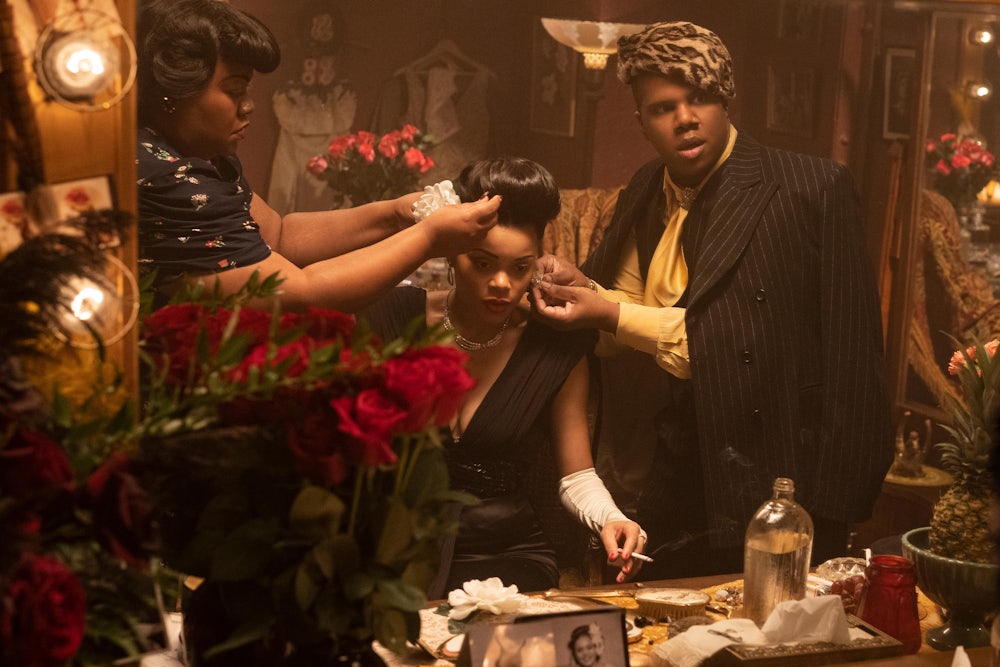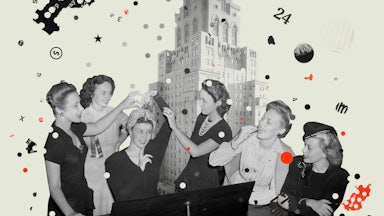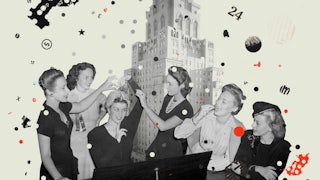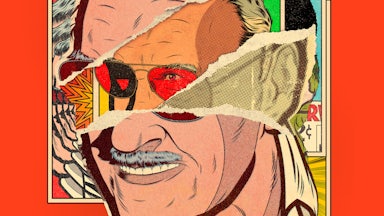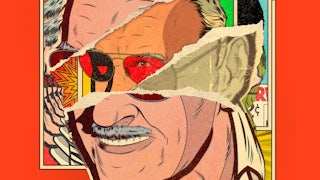Is any genre more vulnerable to the vagaries of ideology than the lavish artist biopic? The essential dilemma is how to milk the life for drama while also accommodating what was singular enough to merit biopic treatment in the first place: the work. Being juicier, the life tends to take over, rendering the art some half-accidental outcropping of painful experience. And a life story invites a moral—looking at someone else’s from beginning to end, you can’t help but see how it might have gone better.
This problem is especially pronounced in the case of Billie Holiday, whose personal life was filled with traumatic incident, from the rape in her childhood for which she was locked up longer than her attacker to the cruel, disloyal husbands to the repeated drug arrests that put her in jail, robbed her of her cabaret license, and, friends said, helped kill her at 44. If you based your idea of Holiday on the 1972 film Lady Sings the Blues, you’d find little trace of the intelligence, frank sexuality, fun, or subversiveness that can be heard in her music. Most preposterous is that film’s reimagining of her third husband, Louis McKay, who beat her up and stole her money, as a luminous Mr. Big, showing up like a fantasy daddy to rescue her at every turn but unable to break the addiction that destroys her. Despite Diana Ross’s captivating performance, the film helped popularize a neutered, patronizing version of Holiday, as a troubled child unable to cope with her environment.
Maybe each era invents the Lady Day that suits it. Lee Daniels’s new drama, The United States vs. Billie Holiday, sweeps in as a valiant corrective, starring the singer Andra Day as a complicated, impulsive, vibrant person—swearing, punching, enthusiastically bisexual, as we glean right away when she gives her lover Tallulah Bankhead (Natasha Lyonne) an exuberant wink from the stage. As the film’s title suggests, it focuses on a quality absent from Lady Sings the Blues: Holiday’s political courage. In 1939, aged 23, appearing at the integrated New York nightclub Café Society, she decided to close her set with “Strange Fruit,” the protest song written by Abel Meeropol, a Communist. It’s hard to overstate the likely effect of confronting, over cocktails at a jazz club, this vivid evocation of a lynching that’s also a metaphor for a nation shot through with murderous racial injustice: “Blood on the leaves and blood at the root.” Her label, Columbia, wouldn’t record it. Occasionally over the years, audience members walked out or threw things; law enforcement and some club promoters warned her not to perform it, but she refused to stop.
Daniels’s film presents this refusal as the start of the campaign of surveillance and harassment she suffered from Harry Anslinger and his Federal Bureau of Narcotics (with help from several men close to her), culminating in 1959 when she was handcuffed on her deathbed in the hospital. The film’s action begins in the period surrounding her first drug arrest, in 1947, and the eponymous trial that followed, after which, set up by her agent and without legal representation, she was jailed for a year.
This bold and rebellious version of Holiday makes more intuitive sense than the 1970s one, and will be more appealing to contemporary audiences (me included). At times, though, the script by playwright Suzan-Lori Parks creaks under its own weight, as if the characters are being enlisted to tell viewers exactly how to interpret events. I lost count of how many people spell out that drugs are just a pretext for the authorities to get Holiday, when their primary motive is to punish her for “Strange Fruit.” “She’s singing it for all of us,” a mother castigates her son, the Black FBN agent Jimmy Fletcher (Trevante Rhodes), who’s just led the 1947 sting against Holiday. “You hate her!” Fletcher later tells his ex-colleagues. “Despite all the shit in her life, she’s made something of herself, and you can’t take it, because she’s strong, beautiful, and Black!”
James Erskine’s recent documentary, Billie, is a strange, fascinating complement to Daniels’s movie. Based on tapes of journalist Linda Kuehl interviewing people who knew Holiday, Billie features many of the same figures that the drama does, but benefits from not needing to digest its source material into a coherent theme and plotline. In that sense, it feels truer to the spirit of Holiday’s work, in which she was able to tease so many rich and conflicting layers of meaning and emotion out of the lyrical slush of Tin Pan Alley. Kuehl died young in 1978 and never finished her biography. Using interviews with Kuehl’s sister, Billie is framed by the writer’s struggle to do right by Holiday, her entanglement with some of her sources, and her mysterious death.
The thrill of the documentary is in hearing the voices of key players in Holiday’s story and their competing versions of events. Producer John Hammond claims Holiday quit Count Basie’s band in 1938 because she wasn’t making enough money and didn’t get along with Basie. But their drummer at that time, Jo Jones, insists that Hammond himself “fired her, because he wanted her to sing the blues … he wanted her to be a colored mammy!… He wanted her to just be ‘Yassir, boss!’” The smallest details recorded here are memorable: the childhood friend who recalls how Holiday liked telling men on the street, “Suck my ass, motherfucker!” undeterred by their often violent responses; the fact that, at diners on the road with Basie’s band (with whom she was sometimes deemed too light-skinned to perform) and then with Artie Shaw’s (too dark), she’d always order an extra hamburger to stash in her purse for the next time she was refused service.
One of her white bandmates from the Shaw period explains blithely to Kuehl that they often stayed in hotels that banned her, while she “either slept in the car or the bus, or wherever,” and that when the Lincoln Hotel in New York declined to let her sing with them, “it was just one of those things where the sacrifice there, you know, it had to be Billie.” His comments felt more sinister to me in their casual complacency than even the Lady Sings the Blues account of Holiday’s time touring with a white band, where one of them is creepily eager to inject her with heroin despite her initial reluctance.
Watching the Erskine and Daniels films together confirms the character of the narcotics agent, Jimmy Fletcher, as a point of contention. In the documentary, he despises “junkies” yet is audibly tormented by regret and a lingering attachment to Holiday. Able to get in where white agents couldn’t, he told Kuehl that he’d talked for hours and slow-danced with his target, who was “the loving type.” You can understand the temptation to zero in on such a paradoxical figure and his inscrutable relations with Holiday. But given that he spied on and entrapped her, permanently marring her career and life, it’s disconcerting when Daniels’s movie wrenches him into a romantic lead, even implying that only Holiday’s emotional damage could have hindered her from choosing him over the more thuggish men she loves.
More than 60 years after her death, Billie Holiday’s singing remains uniquely startling. You wouldn’t need to know how innovative she was to feel, intimately, the wit and power of it. She dawdles behind the beat, making submission sound defiant, pain sound sexy and free, contentment sound forlorn, sorrow sound playful. In just a line or two, she can drop you through a trapdoor from despair into elation and back. And as Angela Davis pointed out in Blues Legacies and Black Feminism, the political force and possibility in her work are by no means expressed solely in “Strange Fruit.”
The United States vs. Billie Holiday is, despite its hyper-contemporary attitudes to politics, love, and trauma, an old-fashioned movie, full of crowd-pleasing numbers, luscious Prada gowns, and high drama, complete with the kind of dream/dance sequence that used to interrupt every Hollywood musical. Watching it made me nostalgic in a way that listening to the perennially modern Holiday never does. To blend those glossy pleasures with a serious effort to do justice to Holiday’s contradictions, her spirit, and the contributions she made, defending her against assumptions that still diminish her, is more than most biopics attempt. If the film lacks the negative capability that characterizes Holiday’s own work, that’s unsurprising—and as far as the work goes, her legacy can look after itself just fine.
